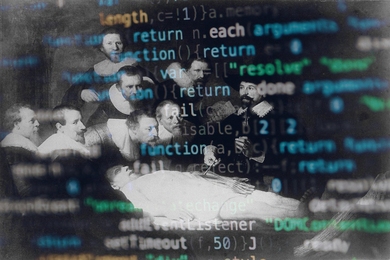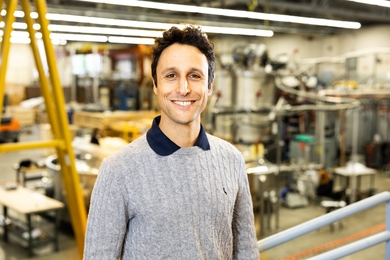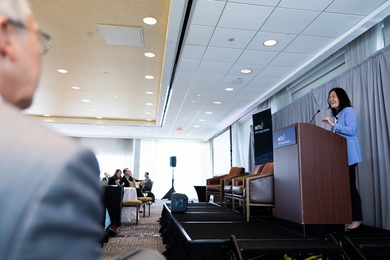"To address any of these issues, you have to take a systems perspective," said Associate Professor Olivier de Weck, associate director of the MIT Engineering Systems Division (home to SDM), which is pioneering integrative methodologies to address these challenges. "Everything is linked."
A "systems perspective" examines complex problems within a broader context of intertwined technological, business and social issues. Taking such a view is critical to solving complex problems, and the work requires integrating approaches from engineering, management and the social sciences, said de Weck.
More than 250 representatives from industry, nonprofit organizations, and academia attended SDM’s conference, held Oct. 22-23 at the Broad Auditorium. The first day centered on infrastructure, notably energy and the environment.
Sharon L. Nunes, IBM’s vice president of Big Green Innovations, outlined the dire state of water management — both in the United States (36 states expect availability problems in the coming decade) and the world (about 40 percent of people already live in a water stressed area) — and described how IBM is working to optimize usage and incentivize conservation through water metering and monitoring.
Creating instrumentation for water systems — including their interconnections, their links to other infrastructure, and knowledge-sharing (often influenced by social and economic factors) — can provide the data needed for intelligent management of the system, she said. She added that good water management is critical to good health, societal stability (as droughts can force migrations), and the economy.
The same is true of energy system management, said Lawrence Willey, manager for Wind Systems Conceptual Design at GE Infrastructure. Like water, energy is affected by political, economic, and societal influences that cannot be addressed with technology alone.
GE Infrastructure is working to reach the goal of 20 percent wind generation by 2030 in the United States, but cannot do so without facing multiple systems issues, Willey said. It is particularly challenging to integrate wind energy, which is intermittent and weather-dependent, into the existing electrical grid, which must meet the peaks and valleys of demand exactly, he said. Better storage options, improved transmission, and a smarter electrical grid may all be needed to meet needs effectively and efficiently — within a larger societal and business framework.
Day two of the conference — which featured a live, lunchtime showing of President Obama’s speech — focused on the "unbelievable systems nightmare that is U.S. health care today," as Dr. Blackford Middleton of Partners HealthCare System described it.
Middleton characterized our current system as an interconnected network of dependencies — doctors send out labwork and bill insurers; labs send results to doctors and bill patients; insurers pay doctors and apprise patients of benefits; and so on. All of these interactions generate information, yet much of the nation’s records are still on paper — a notorious source of errors, said Middleton, who directs clinical informatics research and development at Partners.
"We have a significant knowledge management problem," he said.
Middleton illustrated the benefits of improving the flow of knowledge by relating his experience with the electronic medical records system Partners built, which includes a database that helps doctors make decisions about patient care. Partners worked to create a solution that is not just technical, but takes into consideration the needs of management (saving money and labor), doctors (making the system easy to use), and patients (improving their experience), he said.
"It’s not a panacea," he admitted, but the system has made it easier for doctors to do multiple tasks at point-of-care, and the documentation has led to better compliance with protocols.
Joseph F. Coughlin, director of the MIT AgeLab, emphasized the need for entirely new ways of thinking about the health-care system, asking the audience: As a consumer, do you want the existing system to be better, or do you want a completely different system?
"If innovation is what’s needed, researchers as well as industry leaders have to be willing to take trends seriously — because expectations will change how we define, design, and deliver value," he said. "Rarely, if ever, do you see innovation come from the industry that is under the microscope needing change."
In the future we might get health-care services from private TV channels, our cars, or workplace kiosks, he said. Given the character of today’s aging Baby Boomers, Coughlin said he sees health care moving toward personalized service and a more empowered consumer.
And if that sounds like some other industry — such as telecommunications (iPhone) or transportation (GPS) — that’s not likely to surprise systems thinkers. "The boundaries between these systems are being blurred," de Weck said. "It’s an exciting time to be a systems engineer."
The conference was sponsored by SDM, John Deere, MITRE, United Technologies Research Center, and BAE Systems. The 2010 MIT Conference on Systems Thinking for Contemporary Challenges is scheduled for October 21–22 at MIT.
Presentations from the 2009 MIT Conference on Systems Thinking for Contemporary Challenges can be viewed at http://sdm.mit.edu/index.php?fileName=conf09/presentations.html.






